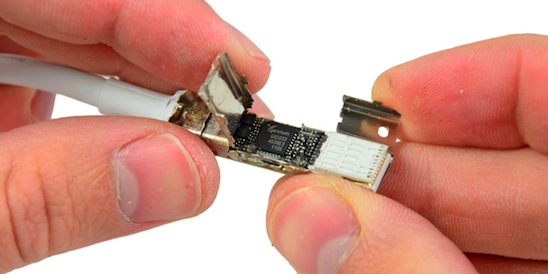Intel and Apple’s jointy developed new transfer technology, which you may know better as Thunderbolt, is shockingly fast. We’re talking two independent channels of 10Gbps transmission. In real world use, recent tests have shown that Thunderbolt is up to 21 times faster than FireWire and USB 2.0. Specifically, writing a 2GB data file using a Thunderbolt equipped MacBook Pro was shown to write a 2GB data file at speeds of 210.5 MBps compared to 29.7 MBps and 47 MBps for USB 2 and FireWire 800 respectively.
So, the always enterprising folks at iFixit it decided to purchase Apple’s new $50 Thunderbolt cable and open it up. Upon doing so, they quickly found that it was an “active” cable with chips containing firmware – which of course helps explain why the cable is so damned expensive.
Explaining the impetus behind the design, Chris Foresman of Ars Technica writes:
These cables contain tiny chips at either end that are calibrated to the attenuation and dispersion properties of the wire between them. Compensating for these properties “greatly improves the signal-to-noise ratio” for high-bandwidth data transmission.
So when iFixit opened up the cable, they discovered that it contains two Gennum GN2033 chips to help achieve Thunderbolt’s impressive transfer rates.
“Unlike ordinary passive cables that can be used at lower data rates, the unprecedented speed of the new Thunderbolt technology places unique demands on the physical transmission media,” according to Gennum’s website. “The GN2033 provides the sophisticated signal boosting and detection functions required to transfer high-speed data without errors across inexpensive Thunderbolt copper cables.”
Despite its impressive speeds, there still aren’t many Thunderbolt hardware options out in the marketplace just yet, a fact which may be attributed to the added cost of implementation. As such, Thunderbolt connectivity may be relegated to higher end products for the time being.
Remember that back in May, Hewlett Packard marketing manager Xavier Lauwaert explained that HP looked into the benefits of Thunderbolt but didn’t see a “value proposition” in the technology just yet. As such, HP is going to push forward with USB 3.0 instead until they’re convinced otherwise.






Mon, Jul 4, 2011
News